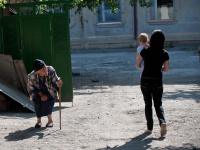IMGXYZ2974IMGZYXRussia recognized South Ossetia, as well as the other former Georgian autonomous region of Abkhazia, as an independent country after the Georgian-Russian conflict in 2008. Since Russia officially recognized South Ossetia’s independence, however, neither Tskhinvali nor Moscow has clearly outlined the goals of a new state project or set out the scenarios and mechanisms for its further development. Alexander Skakov of the Institute of Oriental Studies at the Russian Academy of Sciences spoke about South Ossetia’s future during an event hosted by the Carnegie Moscow Center as part of the Black Sea Peacebuilding Network. Carnegie’s Andrei Ryabov moderated.
Domestic Political Situation in South Ossetia
- Economic problems and opposition: The South Ossetian opposition has considerable potential clout, as many citizens are unhappy with the republic’s leadership, Skakov said. South Ossetia faces low wages coupled with high prices, mass unemployment, and embezzlement of humanitarian aid. Meanwhile, projects that could help improve South Ossetia’s economic outlook, such as the reconstruction of Tskhinvali and the construction of the Dzaurikau-Tskhinvali gas pipeline, have faced massive delays. According to Skakov, there is still no strategy drawn up for South Ossetia’s economic development as a country.
- Presidential elections: South Ossetia’s current president, Eduard Kokoity, is approaching the end of his second term. In 2010, he said that a third presidential term is out of the question for him. Skakov explained that if a member of the opposition were to gain power, it would intensify the battles between local clans and increase political tension throughout the republic. He suggested that the most promising presidential candidates are politicians who are part of Kokoity’s team but have maintained a large measure of independence. He added that neither the campaigns nor the elections would affect South Ossetia’s policy of close alliance with Russia.
South Ossetia and Russia
- A possible member of the Russian Federation: The South Ossetians have always pursued the goal of unification with the Ossetians within the Russian Federation, Skakov said. Most people in South Ossetia support the idea of seeing the republic join the Russian Federation in the near future. However, both the general public and members of the opposition have recently begun expressing more support for real South Ossetian independence.
- Unified and independent Ossetian state: There has been increased interest in the idea of unifying North and South Ossetia into a single, independent state, among both the South Ossetian opposition and some members of the North Ossetian elite. Skakov underscored that while these North Ossetians, who reside in Russia, are not anti-Russian in principle, the fact of Russia’s recognition of two new states in the Caucasus could spur interest in an independent unified Ossetia outside the Russian Federation.
Ultimately, Skakov said, while various scenarios exist for South Ossetia, the republic is likely to remain independent in its current political form for the foreseeable future.
